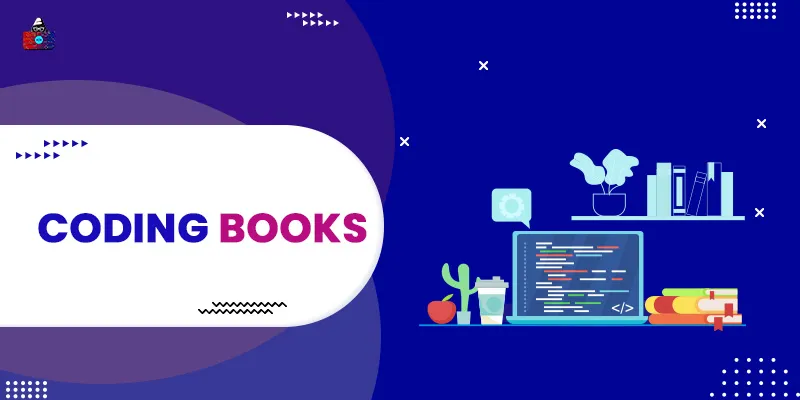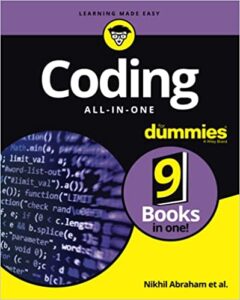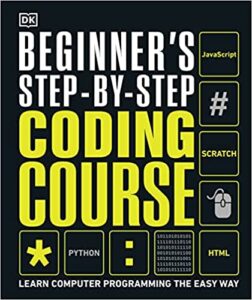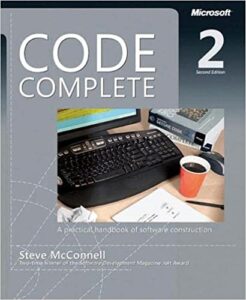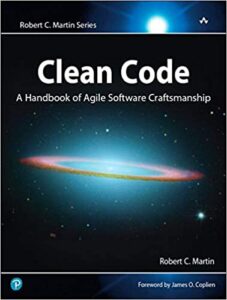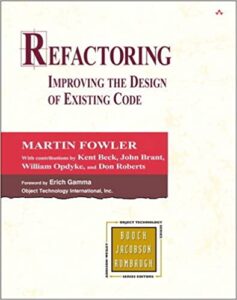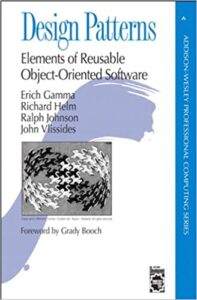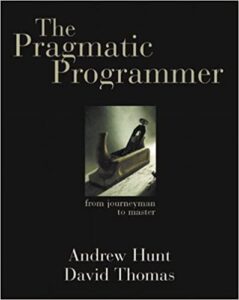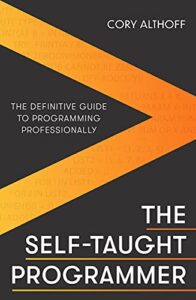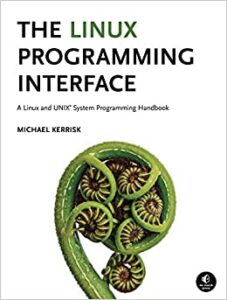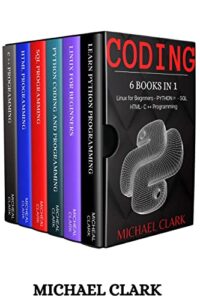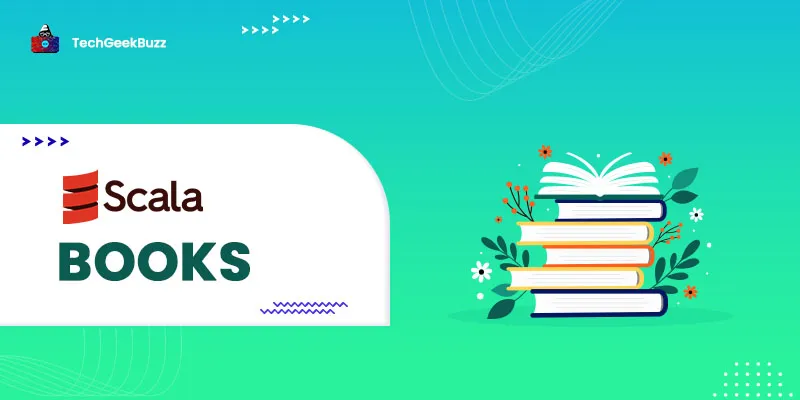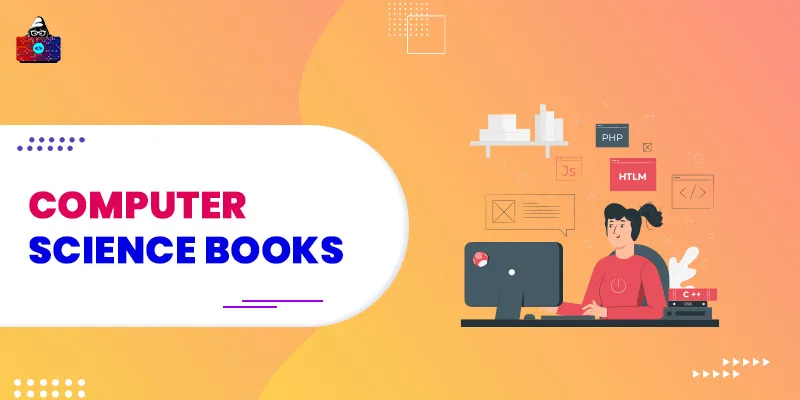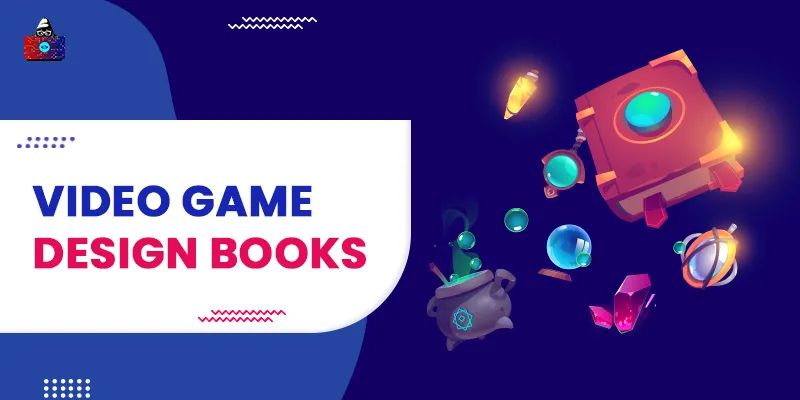Coding is one of the most desired and in-demand skills in today’s digital era. Also known as computer programming, it involves writing a set of instructions to accomplish a specific task. By writing code, you can instruct computers on how to behave and what to do. Here, we will be disclosing our pick of the ten best coding books to read in 2025. Programmers and developers are in great demand today in various industry verticals.
Therefore, most students and even professionals from non-technical backgrounds are striving to learn to code since it offers a wide range of job opportunities. Many online resources, such as tutorials, videos, courses, and boot camps, are available that can help you learn to code. However, the best way to start learning to code is through books since they provide in-depth knowledge of various topics. You need to practice a lot. This article walks you through some of the most popular coding books that you can read to develop and hone your coding skills. So, let us begin!
10 Best Coding Books to Read in 2025
Below, we have compiled a list of the most popular coding books that will help you learn to code. Let's start our list with Coding All-in-One For Dummies.
1. Coding All-in-One For Dummies
Author: Nikhil Abraham
Coding All-in-One For Dummies is the best resource to start learning to code. It introduces you to programming languages and processes required to understand how coding facilitates the development of web pages and applications. Initially, the book walks you through the basic web languages. Later, it moves on to educating you to think like a professional coder and use languages to build large and complex applications.
Furthermore, you will find a step-by-step guide on updating a website and creating a mobile application. It also introduces you to the basics of data science . This book is a perfect guide for individuals who wish to learn to code and become professional programmers.
About the Author
Nikhil Abraham is the CFO of Udacity, an education company that teaches technology skills to help individuals advance their careers. Also, he is the CFO of Resident Home. Formerly, Abraham worked at Codecademy, where he taught coding to beginners. A decade ago, he worked as an economic consultant, where he started coding in SAS and STATA.
Publisher:
For Dummies
Paperback Print Length:
800 pages
You can buy this book from here .
2. Beginner's Step-by-Step Coding Course: Learn Computer Programming the Easy Way
Author: DK
As its name suggests, Beginner’s Step-by-Step Coding Course is a definitive guide for beginners entering the world of programming. It covers three popular languages, namely Scratch, Python , and HTML. This book uses a graphic method to split complex coding topics into smaller and understandable sections to make them easy to grasp.
The end of each chapter consists of practical exercises that aim to teach you the applications of each language. Also, these exercises help you in building websites, designing applications, and creating games. Initially, the coding book introduces you to algorithms, variables, strings, loops, and all other fundamentals of programming.
Later, it moves on to make you aware of short and easy-to-follow steps for writing a complete program. Moreover, you will find other coding languages out there in this book, along with their importance and applications. A team of expert coders and coding teachers has written this book that helps you get started with coding.
About the Author
DK is the world’s leading publisher and a member of the Penguin Random House division of Bertelsmann. It publishes highly visual, photographic, and non-fiction books for adults and children.
Publisher:
DK
Paperback Print Length:
360 pages
You can buy this book from here .
3. Code Complete: A Practical Handbook of Software Construction (Second Edition)
Author: Steve McConnell
Code Complete is considered one of the best practical books on coding. Over a decade, this book by Steve has been assisting several programmers in writing better and more efficient code.
The author has thoroughly updated and revised the second edition of this book with cutting-edge coding techniques, hundreds of new code samples, and best coding practices . He has also highlighted the most effective and must-know coding principles. Through this book, you can discover timeless and effective coding techniques and strategies that will help you:
- Design code for maximum creativity and minimum complexity.
- Apply cutting-edge programming techniques to prevent and reduce errors.
- Use code construction practices that best fit your project.
- Debug errors quickly and effectively.
- Solve critical construction issues at early stages.
- Build high-quality applications.
About the Author
Steve McConnell is one of the best-selling and premier authors in the software development industry. He is the chief software engineer at Construx Software. He was a lead developer of Construx Estimate and SPC Estimate Professional. Also, he is the winner of Software Development Magazine's Productivity Award.
Publisher:
Microsoft Press
Paperback Print Length:
960 pages
You can buy this book from here .
4. Clean Code: A Handbook of Agile Software Craftsmanship
Author: Robert C. Martin
Clean code is one of the best resources for any developer, team lead, software engineer, project engineer, and system analyst. It helps professional coders to write clean and effective code. The author has divided the book into three parts. The first part explains the principles, patterns, and practices of writing clean code.
In the second part, you will come across several complex case studies. Also, each case study helps you transform a problematic codebase into a clean and efficient one. The third part of the Clean Code consists of the list of heuristics gathered while collecting case studies. Through this book, you will learn how to:
- Differentiate between good and bad code.
- Write good code and transform bad code into good code.
- Create good names, functions, classes, and objects.
- Improve the readability of the code.
- Implement error handling.
- Write unit tests and practice test-driven development .
About the Author
Robert C. “Uncle Bob” Martin has been an international software consultant since 1990 and a software developer since 1970. He is the president and founder of Object Mentor, Inc. It is a team of experienced consultants mentoring their clients in the fields of C++, Java, C#, Ruby, Design Patterns, UML, and Agile methodologies.
Publisher:
Pearson
Paperback Print Length:
464 pages
You can buy this book from here .
5. Refactoring: Improving the Design of Existing Code
Author: Martin Fowler, Kent Beck, John Brant, Don Roberts, and William Opdyke
Number 5 on our list of the best coding books is Refactoring: Improving the Design of Existing Code. This programming book explains how refactoring can make object-oriented code simple and easy to maintain. It begins with introducing the reader to the fundamentals of refactoring and dozens of effective tips on improving your code.
In this book, Martin Fowler has mentioned nuts-and-bolts advice on object-oriented programming . Every chapter of this coding book emphasizes the importance of testing after refactoring code. It is essential to test code to verify whether it works whenever you improve it.
Furthermore, the authors have also thrown light on identifying bad code. Finally, the book explores the catalog of over 70 refactorings and tips for better and simpler class design. Every tip explains how the code works before and after applying the tip.
About the Author
Martin Fowler is the chief scientist at ThoughtWorks. For over a decade, he has been applying object-oriented techniques to build enterprise-grade software applications.
Kent Beck is currently affiliated with Three Rivers Institute and Agitar Software. His interests include test-driven development and extreme programming.
John Brant and Don Roberts are consultants and have studied the practical and theoretical aspects of refactoring for six years.
William Opdyke is well-known for his research on refactoring object-oriented frameworks at the University of Illinois. Currently, he is a distinguished member of the technical staff at Lucent Technologies/Bell Laboratories.
Publisher:
Addison-Wesley Professional
Paperback Print Length:
431 pages
You can buy this book from here .
6. Design Patterns: Elements of Reusable Object-Oriented Software
Author: Erich Gamma, John Vlissides, Richard Helm, Ralph Johnson
In this book, the four top-notch designers have presented a catalog of simple solutions to complex and commonly occurring design problems while developing applications. Moreover, they have mentioned simple and succinct 23 design patterns in the coding book. These design patterns help developers create flexible, elegant, and reusable designs.
Initially, the programming book walks you through the design patterns and how they help design object-oriented software. Later, it moves on to explain and evaluate commonly occurring designs in object-oriented software. Moreover, you will explore how each design pattern is applicable in certain situations when to apply a design pattern in your design and the consequences of using a design.
After reading this book, you will understand how different design patterns fit into the software development process and how you can use them to solve your design patterns efficiently.
About the Author
Erich Gamma is a Swiss computer scientist and a technical director at the Software Technology Center of Object Technology International.
John Vlissides worked as a designer, implementer, researcher, lecturer, and consultant practicing object-oriented technology. Currently, he is a member of the research staff at the IBM T. J. Watson Research Center.
Richard Helm is a member of the Object Technology Practice Group in the IBM Consulting Group.
Ralph Johnson is a faculty of computer science at the University of Illinois.
Publisher:
Addison-Wesley Professional
Paperback Print Length:
540 pages
You can buy this book from here .
7. The Pragmatic Programmer: From Journeyman to Master
Author: Andrew Hunt and David Thomas
The Pragmatic Programmer covers the specialization and technicalities of modern software development. It also focuses on the process of modern software development, taking requirements and producing working and maintainable code that delights users.
Moreover, this book covers a wide range of topics, from career development and personal responsibility to architectural techniques to develop maintainable and reusable code. It also describes the best practices and significant pitfalls in different aspects of software development. This makes The Pragmatic Programmer qualify to be counted among the best coding books.
Through this book, you will learn how to:
- Fight software rot.
- Avoid duplicating others’ knowledge.
- Write flexible, maintainable, and adaptable code.
- Avoid programming by coincidence.
- Use contracts, assertions, and exceptions in your code.
- Capture actual requirements, develop code, and delight users.
- Make your development more precise with automation.
Whether you are a beginner or an experienced programmer, The Pragmatic Programmer is an ideal book to boost your coding skills.
About the Author
Andrew Hunt is a consultant and owns a consulting business. He has worked in various fields, including banking, financial services, telecommunications, medical imaging, graphics art, and internet services.
David Thomas is a consultant in various areas, such as aerospace, banking, financial services, travel and transport, and telecommunications. Currently, he is an independent consultant in Texas.
Publisher:
Addison-Wesley Professional
Paperback Print Length:
352 pages
You can buy this book from here .
8. The Self-Taught Programmer: The Definitive Guide to Programming Professionally
Author: Cory Althoff
The Self-Taught Programmer is a definitive guide for individuals who want to learn to code and become programming professionals. Besides helping you learn to code, the author has shared essential tricks that every programmer should know. This coding book serves as a roadmap for writing your first Python program to crack a technical interview.
The author has divided the book into five sections, as listed below:
- Learn to program in Python 3 and build your first Python program.
- Learn object-oriented programming and develop a robust Python program.
- Study computer science basics, such as algorithms and data structures.
- Learn to use tools like Bash, Git, and regular expressions. Use your coding skills to develop a web scraper.
- End with the best coding practices and tips.
About the Author
Cory Althoff is a programmer, author, and speaker. He graduated in political science and then moved on to learning programming. After learning to program, he worked as a software engineer at eBay.
Publisher:
Triangle Connection LLC
Paperback Print Length:
301 pages
You can buy this book from here .
9. The Linux Programming Interface (TLPI): A Linux and UNIX System Programming Handbook
Author: Michael Kerrisk
TLPI is one of the best resources for the Linux and UNIX programming interfaces. It provides detailed descriptions of system calls and library functions, accompanied by clear example programs that you require to master system programming. Hence, it gains the number 9 spot on our list of the ten best coding books to read in 2025.
The author has mentioned the descriptions of over 500 system calls and library functions, more than 200 example programs, 88 tables, and 115 diagrams. In addition, he described Linux-specific features, including the /proc file system, inotify, and poll. This book helps you learn to:
- Read and write files efficiently.
- Create processes and execute programs.
- Write secure programs.
- Use signals, clocks, and timers.
- Build and use shared libraries.
- Write multi-threaded programs with POSIX threads.
- Write network applications with sockets API.
About the Author
Michael Kerrisk has been programming and using UNIX systems for more than two decades. He has also taught many week-long courses on UNIX programming. Moreover, he has maintained a man-pages project since 2004. This project produces manual pages covering Linux kernel and glibc programming APIs.
Publisher:
No Starch Press
Paperback Print Length:
1553 pages
You can buy this book from here .
10. Coding: 6 BOOKS IN 1 : Linux For Beginners – PYTHON (2) - SQL - HTML – C++ PROGRAMMING
Author: Michael Clark
The last entry on our list of the ten best coding books is Coding: 6 Books in 1. Unlike other entries on our list, this one is a collection of books rather than a single book. Nonetheless, it is a perfect guide for beginners to learn Linux, Python, SQL, HTML, and C++ programming. In this guide, you will:
- Understand what Python programming is and how it works.
- Gain insights into the importance of HTML and its fundamentals required to create web applications.
- Learn the basics of C++.
- Gain an understanding of everything about SQL.
- Understand what Linux programming is and how it works.
About the Author
Michael Clark is an American software developer and analyst. He holds a master’s degree in computer science from Stanford University. Also, he taught hundreds of beginner-level programmers.
Publisher:
Independently published
Paperback Print Length:
575 pages
You can buy this book from here .
Conclusion
Because coding is such a sought-after skill in today's world, studying it brings a plethora of job opportunities. For every software developer, programmer, or coder, it is essential to update their skills frequently to come up with something innovative. Therefore, coding involves constant learning to stay up-to-date and relevant in the IT industry.
Though there are several online tools to learn to code, books are the best resources that you should consider. Our selection of the top coding books includes titles for all levels of programmers, from beginners to experienced individuals. Hopefully, this blog has helped you in choosing the best coding books to kick-start your journey as a coder.
Happy Learning!
People are also reading:
